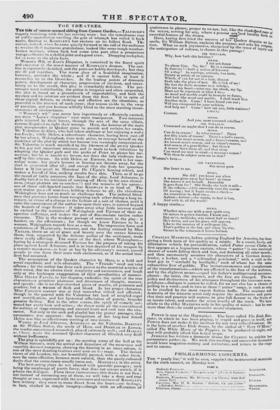CHARLES MATHEWS, before quitting England for America, has been giving
a fresh taste of his quality as a mimic. In a smart, lively, and alliterative vehicle for personification, called Patter versus Clatter, he first appears as a loquacious captain, whose " patter" is one continual shower of words falling thick and fast, and drowning all other speech; and then successively assumes the characters of a German money- lender, a barber, and a " seltimeltal gentlemal," with a cold in the head got in " sereladil by boollight ;" each of whom has the same exhaustless flow of gabble. The instantaneousness and completeness of the transformations—which are effected in the face of the audience, and by the slightest means—equal his father's multipersonal metamoe. phoses : the voice, the manner, and the face are changed. The ra- pidity and distinctness of his utterance throughout the incessant mono- poly/ogee—dialogue it cannot be called, for no one else has a chance of getting in a word—amid in two or three " patters' songs, is such as only to be rivalled by time most expert Italian buffo. The neatness and dexterity of the mimetic artist only require the mellowness and gusto that time and practice will mature, to give full flavour to the fruits of an innate talent, and render the scion worthy of the stock. We here allude to the elder AIATttews only in his quality of mimic: but he was more than that—he could personate niental character.


























 Previous page
Previous page